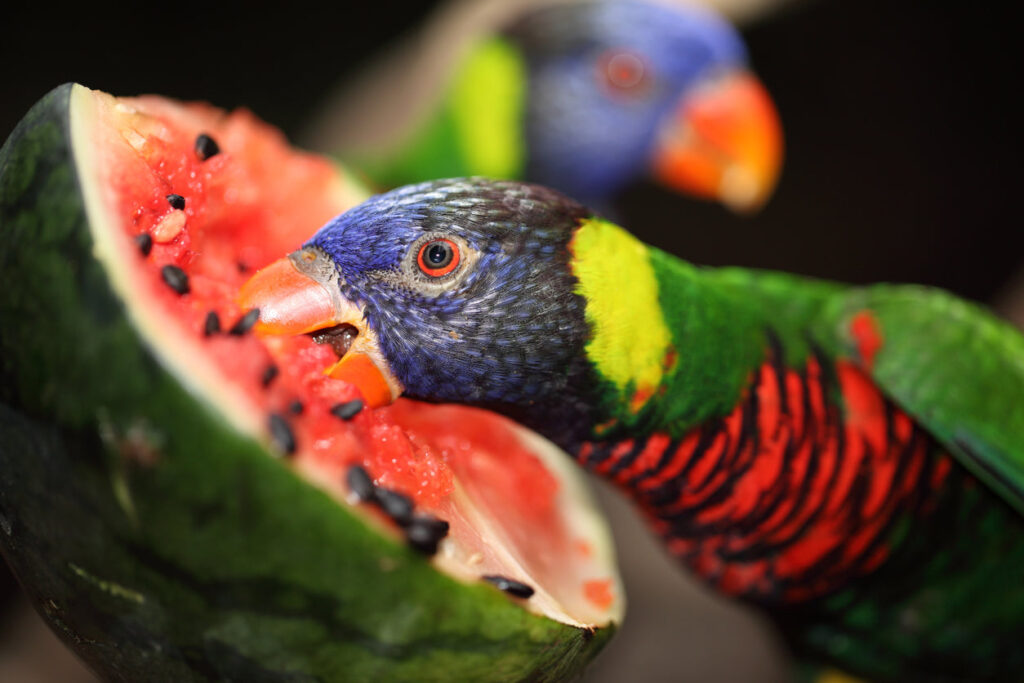Yes, parrotlets can eat watermelon. It is a hydrating and nutritious treat for them.
Table of Contents
Watermelon offers a delightful refreshment for parrotlets, especially during warmer seasons. As a rich source of water and nutrients, watermelon can be a healthy addition to your bird’s diet. Laden with vitamins such as Vitamin A and C, watermelon also contains minerals that support a parrotlet’s well-being.
Can Parrotlets Eat Watermelon? However, it should be served in moderation due to its high sugar content, ensuring that the seeds and rind are removed to prevent any potential choking hazards or digestive issues. Introducing this sweet fruit to your parrotlet’s diet can contribute to their overall hydration, but always balance it with a variety of other suitable fruits and vegetables to maintain optimal health and happiness for your feathered friend. Keep portion sizes small and incorporate watermelon into a well-rounded diet for your parrotlet.
The Nutritional Profile Of Watermelon
The Nutritional Profile of Watermelon is quite fascinating, especially when considering the dietary needs of parrotlets. Watermelon is more than just a refreshing summer treat; it’s packed with essential nutrients beneficial for these petite parrots. Let’s delve into the details.
Vitamins And Minerals
Watermelon is a rich source of vitamins such as Vitamin A, Vitamin C, and B Vitamins including B1 (thiamine) and B6 (pyridoxine). These vitamins are vital for maintaining good vision, immune function, and overall health in parrotlets. Minerals like potassium and magnesium also feature prominently, supporting nerve function and muscle relaxation. Small amounts of calcium, essential for strong bones and beak health, are present too. Here’s a quick rundown of these nutrients:
- Vitamin A: Promotes good vision
- Vitamin C: Boosts the immune system
- Vitamin B1 & B6: Important for brain health
- Potassium: Essential for muscle and nerve function
- Magnesium: Helps with muscle relaxation
- Calcium: Necessary for healthy bones and beak
Sugar And Water Content
While watermelon is certainly hydrating, owing to its 90% water content, it’s important to consider its sugar levels. Watermelon has natural sugars that provide quick energy but can lead to weight gain if fed in large quantities. Sugar content should be monitored to prevent obesity and other health issues in parrotlets. Moderation is key when incorporating watermelon into your pet’s diet.
| Nutrient | Content |
|---|---|
| Water | ~90% |
| Sugars | 6-8% (depending on ripeness) |

Credit: www.reddit.com
Parrotlets Diet Essentials
Parrotlets, those vibrant and vivacious little parrots, thrive on a diet full of variety. Understanding what foods best suit their nutritional needs is key to ensuring these feathered friends live a happy, healthy life. With their playful personalities and striking colors, it’s no surprise that proper diet is crucial for maintaining their overall well-being.
Fruits In A Parrotlet’s Diet
Fruits play a vital role in a parrotlet’s diet. These tiny birds benefit greatly from the vitamins and minerals found in fruit. Including fresh options like watermelon can add hydration and nutrition to their meals.
- Watermelon (seedless)
- Apples (cored and seeded)
- Berries (washed thoroughly)
- Grapes (seedless, in moderation)
Always serve fruits in moderation and ensure they’re free of seeds and pits, to avoid any health issues.
Balanced Feeding For Optimal Health
To keep your parrotlet in top shape, a balanced diet is essential. This involves a mix of fruits, vegetables, seeds, and pellets. Fresh water should always be available.
| Category | Example | Frequency |
|---|---|---|
| Pellets | High-quality parrotlet formula | Daily |
| Vegetables | Broccoli, carrots, peas | Daily |
| Fruits | Watermelon, apple slices | 2-3 times a week |
| Proteins | Cooked eggs, lean chicken | Weekly |
| Seeds | Millet, flaxseeds | In moderation |
Regularly alternating the types of food offered keeps your parrotlet engaged and prevents nutrient deficiencies. Always wash fruits and vegetables to remove pesticides and cut them into manageable pieces to prevent choking.
Safe Foods For Parrotlets
Parrotlets are vibrant companions with specific dietary needs. Just like their larger parrot relatives, these petite birds enjoy a variety of foods. A well-rounded diet ensures their health and happiness. One popular question among parrotlet parents is about watermelon.
Yes, parrotlets can safely enjoy watermelon in moderation. This juicy fruit provides hydration and nutrients beneficial for your feathered friend.
Common Safe Fruits
- Watermelon: Remove seeds and rind before serving.
- Apples: Core and deseed; never offer apple seeds.
- Bananas: Peel and offer in small quantities.
- Berries: Provide a variety such as strawberries, blueberries, and raspberries.
- Grapes: Cut in half to prevent choking hazards.
Toxic Foods To Avoid
| Food | Reason to Avoid |
|---|---|
| Avocado | Contains persin, toxic to birds |
| Chocolate | Has theobromine, dangerous for parrotlets |
| Onion and Garlic | Can cause digestion and blood issues |
| Caffeine | Stimulants are harmful to parrotlets |
| Alcohol | Severely toxic and can be fatal |
Watermelon And Parrotlets: A Good Match?
Parrotlets, the vibrant and energetic companions, thrive on a diet full of variety. While seeds and pellets form their dietary base, fruits like watermelon can offer refreshing variety. Let’s dive into the compatibility of watermelon with parrotlets, examining not just the benefits, but also the necessary precautions.
Hydration Benefits
Watermelon is made up of about 92% water. This makes it a perfect snack for parrotlets for staying hydrated, especially on hot days. Feeding your feathered friend watermelon offers a fun way to:
- Boost their fluid intake
- Support overall health
- Keep them entertained with new tastes
Watermelon’s high water content is also packed with vitamins, such as Vitamin A and Vitamin C, essential for a parrotlet’s robust immunity and vision.
Precautions When Feeding Watermelon
While watermelon is safe for parrotlets, it is crucial to take some precautions:
- Remove seeds to prevent choking.
- Offer watermelon in moderation due to its sugar content.
- Always present fresh watermelon, avoiding processed or sugared varieties.
- Wash the fruit thoroughly to remove any pesticides or chemicals.
Remember that watermelon should only be a treat, not replacing the core of your parrotlet’s diet. Introduce this juicy fruit gradually and watch for any changes in their behavior or droppings, as this can indicate how well they handle new foods.
Feeding Techniques
Welcome to the delightful world of feeding your feathered friends! Parrotlets, those vibrant little bundles of joy, can indeed enjoy the refreshing taste of watermelon. We will guide you through the best practices for feeding watermelon to parrotlets. To keep your tiny companion healthy and chirpy, understanding the feeding techniques is crucial.
Proper Serving Sizes
Portion control is important for parrotlets. A small cube, about the size of their head, is plenty for one serving. Feed watermelon in moderation due to its high water content.
Frequency is key. Offer watermelon once or twice a week as a treat, not a staple. Too much can cause digestive issues.
Always remove uneaten portions promptly. This practice prevents health hazards from spoiled food.
Preparing Watermelon For Parrotlets
Cutting the fruit correctly ensures safety and enjoyment for your parrotlet. To prepare watermelon for your parrotlet:
- Pick a fresh watermelon. Bright color and firmness indicate freshness.
- Clean the outside thoroughly. This removes potential pesticides.
- Remove seeds. Parrotlets can choke on watermelon seeds.
- Chop into small, manageable cubes or thin slices.
- Remove the rind. The tough skin is difficult for parrotlets to eat.
By following these simple steps, you can ensure your parrotlet gets a tasty and safe treat.
| Task | Description |
|---|---|
| Selection | Choose fresh, firm watermelon. |
| Cleaning | Wash the watermelon’s exterior. |
| De-seeding | Remove all seeds to prevent choking. |
| Chopping | Cut into parrotlet-friendly sizes. |
| Serving | Offer a head-sized piece to your pet. |
Always supervise your parrotlet during snack time. This ensures they’re eating safely and not overindulging.
Potential Health Concerns
Parrotlets, like many birds, enjoy a variety of fruits in their diet. However, introducing watermelon should be done with caution due to potential health concerns. Exploring these concerns ensures your feathered friend remains happy and healthy.
Risks Of Overfeeding Fruits
Parrotlets can develop health issues from too much fruit. Watermelon is high in sugar which, in excess, can lead to:
- Obesity – extra weight can harm a parrotlet’s health.
- Diabetes – a serious disease affected by diet.
- Digestive problems – from too much fruit in their diet.
It’s important to balance their diet, where watermelon is just a small part.
Signs Of Dietary Imbalance
A balanced diet is key for parrotlets. Watch for these telltale signs of dietary issues:
| Sign | What It May Mean |
|---|---|
| Weight change | Possible overeating |
| Feather issues | Lack of nutrients |
| Low energy | Not enough variety in food |
Regular check-ups with a vet can catch these early. A balanced diet keeps parrotlets in top shape!
Introducing New Foods To Your Parrotlet
Fruits like watermelon can be a tasty treat for your parrotlet. Yet, changing a bird’s diet needs care. Start with small amounts. Watch your feathered friend’s reaction to the new food closely.
Observing Your Bird’s Reaction
First, offer a tiny piece of watermelon to your parrotlet. Notice how the bird approaches the new food item. Some may dive right in, others might be wary.
- Monitor for any changes in behavior or droppings over the next 24 hours.
- Check if your parrotlet eats the watermelon or ignores it.
If the bird enjoys it and shows no negative signs, you can include watermelon as a part of their diet occasionally.
Incorporating Variety In Meals
Parrotlets thrive on diverse diets. Combining different fruits, veggies, and grains keeps meals exciting. A varied diet also ensures they get all needed nutrients.
| Food Type | Examples | Frequency |
|---|---|---|
| Fruits | Watermelon, Apples, Berries | 2-3 times a week |
| Veggies | Kale, Carrots, Peppers | Daily |
| Grains | Brown rice, Quinoa | 2 times a week |
Rotate foods to prevent nutritional imbalances. Use a variety to keep your parrotlet healthy and happy.

Expert Opinions
Expert Opinions shed light on what parrotlets can eat. One common question arises – can parrotlets eat watermelon? Let’s explore what vets and experienced owners have to say.
Veterinary Advice On Parrotlet Diet
Veterinarians specializing in avian health often stress a balanced diet for parrotlets. Fruits like watermelon are safe and healthy in moderation. The key nutrients found in watermelon make it a suiting treat. They recommend considering the following:
- Remove all seeds to prevent choking hazards.
- Offer watermelon in small amounts to avoid upset stomachs.
- Always serve fresh watermelon, avoiding any processed forms.
- Include this treat as part of a varied diet.
Best Practices From Experienced Owners
Long-time parrotlet caregivers echo veterinary guidance. They offer practical advice based on firsthand experience. These tips constitute the best practices for feeding watermelon to parrotlets:
- Introduce watermelon slowly into their diet to ensure they digest it well.
- Observe reactions or changes in behavior post-consumption.
- Provide fresh, clean water after feeding them watermelon.
- Limit watermelon intake to avoid reducing the space for essential nutrients in their daily food intake.
- Store fresh produce appropriately to maintain its nutritional content.
Conclusion
To wrap up, parrotlets can enjoy watermelon as a hydrating snack. Just remember to remove seeds and serve in moderation for a healthy diet. It’s a sweet treat that, when given properly, can contribute to your feathered friend’s well-being. Always consult a vet for personalized advice on your pet’s nutrition.
Ryan Everhart is a passionate bird enthusiast and blogger, primarily writing on his website, Avian Whispers. His journey into the world of bird blogging began with a deep interest in parrots, a species that captivated his attention for their intelligence and social behavior. Over time, his content expanded to cover a broader range of bird species, offering insights into bird behavior, care, habitats, and conservation.
Ryan is dedicated to educating his audience, which includes both new bird owners and seasoned enthusiasts. His writing is filled with personal experiences, expert knowledge, and practical advice on bird care. Through Avian Whispers, he aims to foster a deeper appreciation for birds, emphasizing their role in nature and the joys of having them as pets.
Starting with articles focused on parrots, Ryan’s work now encompasses a diverse range of topics such as feeding, training, habitat enrichment, and bird health. His love for birds extends beyond parrots, diving into various avian species. His informative and heartfelt writing reflects his commitment to the well-being of birds and the desire to help others connect with these creatures.
As a growing voice in the bird blogging community, Ryan strives to provide a platform where bird lovers can learn, share experiences, and connect over a shared passion for avian life. His blogs are not only educational but also serve as a reminder of the importance of protecting and nurturing the bond between humans and birds.




